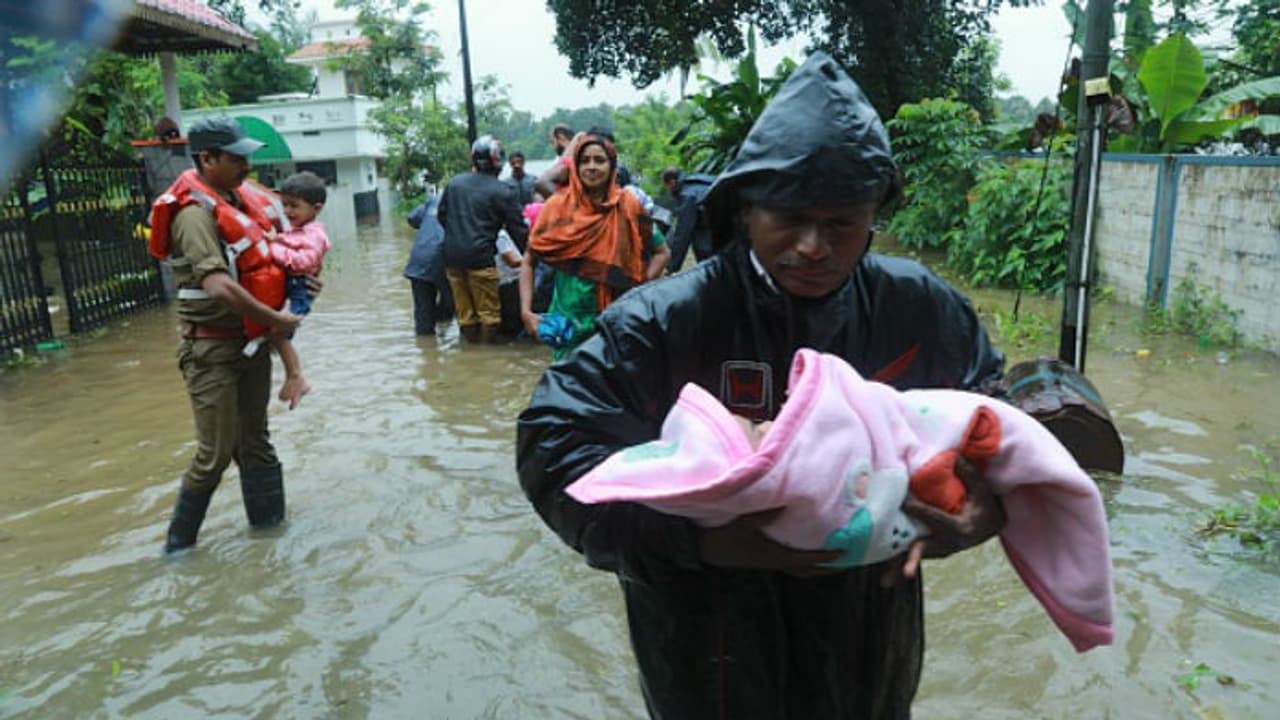India's stance can be seen as an expression of its soft power. It is also a continuation of a policy started by the Manmohan Singh government
India can put its house in order. It doesn't need help from outside.
That's the message the Narendra Modi government sent out when it declined aid from foreign countries and agencies for rebuilding lives in Kerala, which has been ravaged by floods.
More than 200 people have died and nearly 11 lakh people have been displaced, which led the Union home ministry to declare it as the worst instance of flooding in a 100 years and a “calamity of severe nature”.
Yet, the ministry of external affairs has directed all envoys to politely refuse all offers for aid from foreign nations. The United Nations has also been informed that India is in no need for aid and can manage relief and rebuilding activities in Kerala.
What could be the reason for the Centre to turn down offers for help? Can it be interpreted as cockiness that can antagonise friends?
Congress MP Shashi Tharoor subscribes to that line of thinking. He had tweeted that he would consult UN and other international humanitarian agencies for assistance to rebuild Kerala during his visit to Geneva. This despite India’s stated policy on foreign aid, which he must have been aware of, being a minister in the former UPA government.
India's stance, however, can be seen as an expression of its soft power. It is also a continuation of a policy started by the Manmohan Singh government.
Gone are the times when India would be dependent on rice from the US to save its people of hunger, or mortgage its gold reserves to get a loan from the International Monetary Fund (IMF). Today, India is not only trying to shed its tag of a recipient, but more significantly, it is positioning itself as a major donor.
Therefore, it is not surprising when India turns down the Rs 700-crore ($100 million) offer of assistance by the UAE, or the Rs 35 lakh ($50,000) offered by the Maldives, or indeed the offer from Thailand. It must be seen instead as the Modi government’s unwillingness to jettison a policy that firmly establishes India as a credible economic and political power.
“We feel that we can cope up with the situation on our own and we will take their help if needed,” Manmohan had said when a tsunami had ravaged large parts of coastal India in 2004, killing over 12,000 and displacing more than 6 lakh.
Instead, India had given $25 million to Sri Lanka, $1 million to Indonesia and $500,000 to Thailand for relief and rehabilitation in the aftermath of the tsunami. India had also sent food, blankets and other essential items to help Sri Lanka get back on its feet.
It was the same policy of self-reliance and expression of soft power that led India to turn down help during the 2005 Kashmir earthquake, but offer a $25 million assistance to Pakistan. It also sent blankets, medicines and food to rebuild lives in Pakistan-occupied Kashmir.
It was the same policy that led India to refuse Russia's help during the Uttarakhand floods in 2013.
“As you know, as a general policy in case of rescue and relief operations we have followed the practice that we have adequate ability to respond to emergency requirements. And for a variety of reasons we have not also in the past too, unless there are specific circumstances, been able to accept offers of assistance for rescue and relief,” the then MEA spokesperson Syed Akbaruddin had stated.
India's situation today is in stark contrast with that when it was in need of external assistance as during the Uttar Kashi and Latur earthquakes in 1991 and 1993 respectively. It also accepted aid during the Gujarat earthquake in 2001, Bengal cyclone in 2002 and Bihar floods in 2004.
India's policy today also establishes it as a world leader during disaster relief operations. It had sent aid to the US too after Hurricane Katrina in 2005, while telling Uncle Sam to send its donations to NGOs in India in case of a calamity here. Even a hostile country like China, much like Pakistan, have received Indian help.
